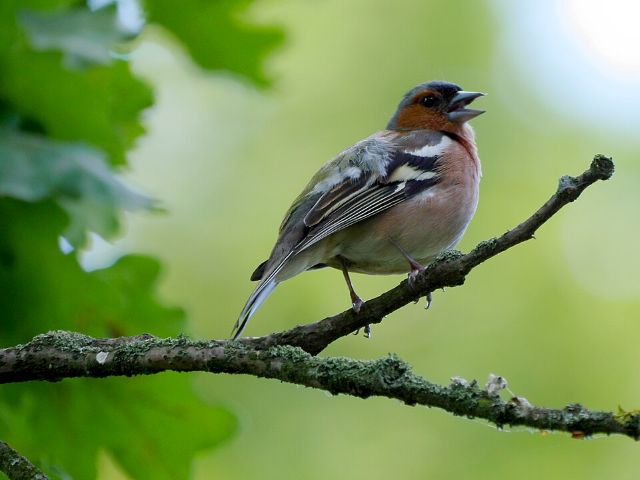Chaffinch warns mate if nest is in danger
With his rain call, a male common chaffinch warns its partner of predators that threaten eggs and young, Léna de Framond and colleagues show.
A common chaffinch not only can produce its song with the characteristic flourish at the end, but also an often-melancholic sounding ‘rain call’. This call has nothing to do with coming rain. What does it mean, Léna de Framond and colleagues wondered.
It is a peculiar call, different from the other calls that the common chaffinch (Fringilla coelebs) has in its repertoire. Only a male calls this call; he repeats it every few seconds and continues to do so for minutes. He calls only during the breeding season and from his territory. And, as in songs, there are dialects, or local differences, which means that the call is partly learned. Its function, De Framond writes, was not known until now.
Playback
There are several possible functions. The rain call, like the song, could be a way to charm a female or to defend the territory and scare off rivals. It could serve as a warning signal to other birds when a predator appears. Or it could be a form of communication between male and female.
To find out which of the three possibilities applies, the researchers did playback experiments in a forest. First, they let male chaffinches listen to the chaffinch’s song, his rain call or, as a control, the song of a blackbird. They noted how each male finch responded to the sound offered: did he sing or call, or did he become aggressive.
In another experiment, they played the sound of a predator or the song of a blackbird with increasing intensity to see if that would elicit the rain call. As enemies they chose the Eurasian sparrowhawk, which hunts adult chaffinches and sometimes grasps young, and the carrion crow, which does not attack adult finches but plunders nests. In both playback experiments they noted whether a female or another male was nearby. In addition, they observed the spontaneous behavior of finches.
Nest in danger
These experiments and observations provided clarity about the function of the rain call: the second possibility – that it is an alarm signal – is the correct one. But it is not a general alarm signal. It is specifically aimed at the partner and warns her when the nest is in danger.
This result is consistent with the fact that the male guards and defends territory and nest, while the female builds the nest, incubates the eggs and raises the young; he helps with feeding them, but she does most of the work. And to complete the story: when dad calls the rain call, the young fall silent so as not to attract the attention of nearby predators.
The rain call is often heard. Apparently, life is not without worries for a chaffinch family.
Willy van Strien
Photo: Male common chaffinch. Membeth (Wikimedia Commons, Creative Commons, public domain CCO 1.0)
The rain call of common chaffinch on YouTube
Source:
Framond, L. de, R. Müller, A. Comin & H. Brumm, 2025. Decoding the chaffinch “rain” call: a female-directed alarm call? Behavioral Ecology, online 4 May. Doi: 10.1093/beheco/araf039
